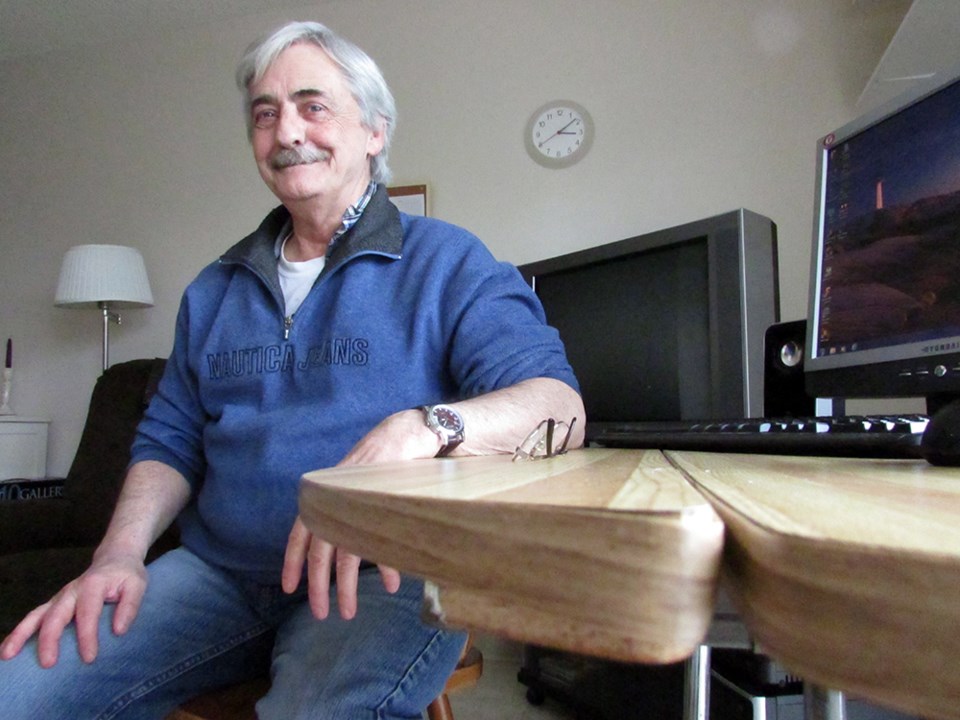A year-and-a-half ago, Fred Page was literally on his hands and knees at the door of Seniors Services Society looking for help.
Page had been living on the streets for decades and was one of those antisocial, "hard to house" types, who prefers the outdoors to a shelter. He spent years addicted to drugs, eating from dumpsters and collecting bottles to earn cash.
But on this particularly wet, grey day, he collapsed on the streets in downtown New Westminster, unable to breathe with chronic obstructive pulmonary disease.
"I seen the door to Seniors Services. ... I physically crawled through the door," he says. "They took one look at me, ... I was choking. I needed to be in the hospital."
Page went to Royal Columbian but eventually was placed in the society's temporary housing program in neighbouring Burnaby.
Burnaby does not a have a permanent year-round homeless shelter, which has been cause for criticism and a point of contention in the city. But this program is a bit different and flies under the radar, because it's not a shelter per se - it's temporary housing. Seniors Services Society rents 20 housing units in three Burnaby buildings, (Swedish Manor and two B.C. Housing properties), and they sublet the suites to seniors.
The seniors pay for the suites, using social assistance or their pensions, but they never pay more than 35 per cent of their income.
Seniors Services Society started the program in 2007, and since then has housed 172 seniors, most of whom moved on to permanent housing. But the numbers they turn away are even more telling. In 2013, for example, 263 people were turned away, so for every two people accepted into the program, three were rejected because they just didn't have the space.
The temporary housing program may be in high demand, but the sole source of funding is about to dry up this September. The program has always been funded by the United Way to the tune of $200,000 per year.
But even the United Way is struggling. The non-profit has seen a drop in charitable donations and is ending more than $1.6 million in funding for seniors' programs, including this very one that pulled Page off the streets.
"We've been extremely grateful," says Kara-Leigh Bloch, the society's executive director. "We are parting ways amicably. They are helping us find new sources of funding."
The housing program isn't the only casualty. United Way was also funding two other programs with the society: a bus program to get seniors out in the community, and a housing directory to help seniors find homes. In all, Seniors Services Society will be short $300,000 for all three programs.
Bloch is in talks with various levels of government and private service clubs in hopes of securing replacement funding for the temporary housing program.
"There's so much need. We have shelters, hospitals, relying on us to service the vulnerable seniors, it would be devastating to let it go," Bloch says.
According to Bloch, the program is cost-effective. It costs $20 a day to house someone like Page in their program, but keeping seniors in homeless shelters typically costs $100 per day, she says.
"It's not only cost-effective, it guarantees permanent housing for seniors, where shelters are not able to make that claim," she adds.
It's been a year-and-a-half since Page crawled in from the streets of New Westminster. He says he's been clean for two years, and he happily shares his story in his new apartment, although his situation is a bit unusual. While most seniors go on to live in other places, Page managed to befriend the people in his building, and when the Swedish Manor had an opening, he was slotted in.
He is now the proud inhabitant of a sparsely decorated studio apartment, with a kitchen and bathroom, and a bed on the floor - but he's grateful for much more.
"They gave me back my dignity. They gave me back a lot of my self-esteem," he says. "They gave me back something you search for on the street but never find: somebody who cares."
Page is still on social assistance, and he's settling into his new, stable home and fostering an interested in writing and public speaking.
Meanwhile, Bloch is hoping the general public will donate or create a trust in the name in program. To help, call the society at 604-520-6621.



